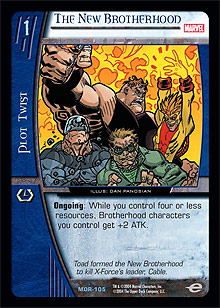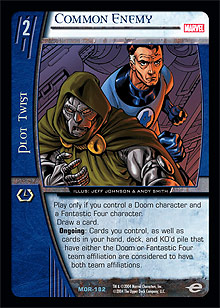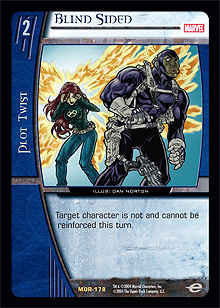It’s a new year here at Metagame.com, and boy do we have all kinds of treats in store for you! This week, if you haven’t noticed, all the articles have a special focus; we’ve all been zeroing in on classic Marvel trademarks of Vs. System past. Today, I am going to take you all the way back to the beginning, when Vs. System was just a twinkle in the eye of UDE, and Marvel Origins ruled the comic TCG world. At this early stage of game development, metagames were not readily known (I honestly don’t know if half of the Vs. players at the time knew what “metagame” actually meant), which put a lot of players in a bind. I happened to be one of those players. During that time, I did a lot to try to improve my play skill. I didn’t have a team to lean on, nor was I a master of this game (I’m still not one today; I am just a little more proficient than I used to be). Instead, I was forced to either adapt to an unknown metagame or fall behind the curve. Today, I am going to talk about that process and how to replicate it. Specifically, this article will be an attempt to detail how to become a better Vs. player when you don’t have a strong group of core players to lean on and are forced to develop your skills on your own.
In the Beginning . . .
I remember way back when I first heard about Vs. System. I remember being very excited about the prospect of playing a TCG that involved my favorite comic book characters. I didn’t play any of the comic book TCGs that preceded Vs. System, so I came into the game wide-eyed and excited. Players in my area warned me that it would be a waste of time, but thankfully, they could not have been more wrong.
At this time, I was a fresh-faced player who was just looking to have a good time. Then I heard about the Pro Circuit. I was floored! You mean I can actually get paid to play? It was too good to be true. I was immediately hooked, and determined to fulfill a lifelong dream of being a professional gamer. What would follow would be a wild trip from random scrub to Pro Circuit competitor.
What Strikes Your Fancy?
I have often pointed out that an important thing to remember when you are trying to become a top level player on your own is to play what you know. However, I would also throw in the concept of “playing what you like.” In other words, don’t try to play a control deck if you don’t understand the concepts or don’t like having to think and rethink decisions. Likewise, don’t play a rush deck if you are more suited to being reactive and dictating how the game progresses. First and foremost, you must learn your play style—what works for you and what doesn’t.
 When the game first came out, I was impressed with the power that the Brotherhood team had to offer. I liked the concept of playing a card every turn and just dealing as much damage as fast as possible. It was easy for me to understand, which was important, as I had never been a “competitive” TCG player on any level before. Don’t get me wrong—I played an assortment of games, but it was always casually. I just didn’t have the desire or skill level to make that next step. With Vs. System, however, I was determined to make it to the first Pro Circuit in Indianapolis. Due to my lack of experience in TCGs, playing a deck that essentially played itself (The New Brotherhood) made a lot of sense, and it worked well with my unrefined play skill.
When the game first came out, I was impressed with the power that the Brotherhood team had to offer. I liked the concept of playing a card every turn and just dealing as much damage as fast as possible. It was easy for me to understand, which was important, as I had never been a “competitive” TCG player on any level before. Don’t get me wrong—I played an assortment of games, but it was always casually. I just didn’t have the desire or skill level to make that next step. With Vs. System, however, I was determined to make it to the first Pro Circuit in Indianapolis. Due to my lack of experience in TCGs, playing a deck that essentially played itself (The New Brotherhood) made a lot of sense, and it worked well with my unrefined play skill.
Know Your Surroundings
Even if you are not on a team, you still need to be aware of the metagame around you. An individual can develop a deck just as strong as a group of players as long as he or she takes into account what will or won’t show up in a given tournament. Granted, making these determinations can be hard, but there are ways to help your prediction skills.
The first place to start would be your local tournament scene. Each person has his or her own likes and dislikes, and familiarizing yourself with as many deck choices as possible will help you when you are constructing a deck. I would go to every tournament I could, just to see what was out there. I remember vividly the first time I saw someone play The New Brotherhood. First of all, I was excited just because I thought the art was amazing. Second, the deck was unbelievably potent. It was by observing other individuals that I first discovered what I wanted to play. I also gained invaluable information about other deck choices that didn’t strike my fancy, such as Common Enemy, Wild Vomit, or Fantastic Fun.
 After visiting the local scene, the next thing to do is remember that the internet is your friend. This was, far and away, my biggest tool when I started out. I remember constantly looking at PCQ results and trying to determine why decks placed the way they did, then building up the decks that placed in the top two spots and running them against what I was testing. For the most part, Common Enemy was in the Top 8 of every PCQ, so I would be most interested in what new cards would be included. At this time, Overload had not quite gotten the mass attention that it would eventually receive, but I started to notice its inclusion in a variety of decklists. This led me to make important changes to my deck that we will discuss momentarily.
After visiting the local scene, the next thing to do is remember that the internet is your friend. This was, far and away, my biggest tool when I started out. I remember constantly looking at PCQ results and trying to determine why decks placed the way they did, then building up the decks that placed in the top two spots and running them against what I was testing. For the most part, Common Enemy was in the Top 8 of every PCQ, so I would be most interested in what new cards would be included. At this time, Overload had not quite gotten the mass attention that it would eventually receive, but I started to notice its inclusion in a variety of decklists. This led me to make important changes to my deck that we will discuss momentarily.
Lastly, don’t be afraid to ask others for advice. Starting out, I remember being intimidated by the players who were dominating my local scene. But I also remember asking a rather short fellow to look at my deck and give me some critiques. The information that he gave me, even though I did not know him well at the time, was invaluable in determining what was working and what was not. By asking for advice, you are strengthening the overall Vs. System community and potentially making good friends. Who knows? Maybe you’ll be lucky like me and meet the next Tim Batow!
You Got the Info . . . Now What?
After you have done your homework and gathered enough information to try to predict the metagame, you must then put that information to work. Particularly, you must learn to alter and adapt your deck to the expected environment. That is generally easier said than done.
This is a problem that every player goes through, regardless of whether he or she is alone or involved with a competitive team. When I was faced with this problem, the situation was unique. With only two sets released, the pool of potential “tech” cards I could include in my deck was minimal, so it was fairly easy to ascertain what would be an adequate inclusion given my predicted field. Specifically, I liked two cards: Blind Sided and Overload.
When I saw Overload in decklists, I realized that it provided a decent bit of synergy with the amount of pump that I was playing in my deck. At that time, the Savage Beatdown / Overload combo was not well known. I felt like it gave me an edge in a The New Brotherhood mirror, as well as allowing me to finish early by negating an opponent’s attack. By playing that card in a rush deck, I was able to surprise many opponents who were not expecting me to be playing defensive-minded cards in such an aggressive deck.
 Blind Sided was actually a card that a good friend of mine suggested. He played that card in every deck he ever built, so I got to see it in action a lot and really liked what it gave. Essentially, if you played it correctly, you could exhaust a problematic character that you didn’t want to have swing back into you (by forcing your opponent to reinforce, and then subsequently playing the card to negate the reinforcement). Also, on a strong draw, Blind Sided could allow you to finish early with Sabretooth, Feral Rage and a well-timed Savage Beatdown.
Blind Sided was actually a card that a good friend of mine suggested. He played that card in every deck he ever built, so I got to see it in action a lot and really liked what it gave. Essentially, if you played it correctly, you could exhaust a problematic character that you didn’t want to have swing back into you (by forcing your opponent to reinforce, and then subsequently playing the card to negate the reinforcement). Also, on a strong draw, Blind Sided could allow you to finish early with Sabretooth, Feral Rage and a well-timed Savage Beatdown.
I was made aware of both of these cards by talking with players and doing internet research. I still believe that these tactics can pay off if done with diligence. If you can identify game-changing cards for your current environment, you will have an edge on your opponents and be in a great position to succeed.
You Have the Info, Your Deck is Teched . . . Now it’s Tourney Time!
After you have incorporated all the above suggestions, the next step is to take your superior deck to a major event. By major event, I mean something other than your local Hobby League or weekly tourney. Vs. System has undergone a lot of exciting changes lately, and Scott Gaeta has a lot of interesting things in store for 2007—not the least of which is the intriguing announcement of City Championships. Attending high level events will give you an idea of what to expect at a Pro Circuit while honing your play skills against other competitive players.
When Vs. System first came out, the only events that were available were Pro Circuit Qualifiers. I remember driving to St. Louis with a friend in hopes of qualifying for the first Pro Circuit Indianapolis. The event was Constructed, and I took my The New Brotherhood deck, feeling nervous and unsure of what to expect. I ultimately finished 4th, with my friend actually getting the invite. Over the next month and a half, I traveled to four different Pro Circuit Qualifiers across a four-state area but still did not notch an invite. That kind of travel is unlikely to be necessary now, considering the large number of PCQs, but it says something about the dedication to the game you must have. As an individual player, what you lack in group thought and playtesting needs to be made up for with desire and dedication. Many of the individuals that you are going up against have the benefit of several players giving them direction as well as the added bonus of playing with people who have had a large amount of success and know how to replicate it. Desire, however, cannot be replicated. If you want something badly enough and are willing to work hard enough for it, you can attain it. It is only when you start doubting yourself that you open yourself up to failure. Even if you don’t get the invite, as was the case with me, you still have won. Traveling to all those events made me a much better player, and it allowed me to meet a ton of really good people. Did I get the reward that I wanted? Not really, but it didn’t deter me, and I still got benefit out of it (via improved play skill and experience). That is the mindset that you need when you are a “lone wolf.”
The Big Show!
Because I didn’t qualify through a Pro Circuit Qualifier, I was left only with the Last Chance Qualifier events held the day before the Pro Circuit. I went with my friend (who qualified at the first PCQ I attended), but I doubted that I would make it due to my string of recent failures. Still, when the day arrived, I realized that I had nothing to lose. If I didn’t make it, I would be in the same situation I was in when I arrived, and if I did succeed, all those previous trips would have paid off.
I took my The New Brotherhood deck again, and I coasted through the Qualifier. It was a great confidence boost, and making it to the PC was a huge accomplishment for me. Honestly, I would have been happy even if I fell flat on my face the next day. Thankfully, that was not my fate. The cards that I felt would serve me well—Blind Sided and Overload—ended up being MVPs, as they helped me turn games around when my opponents least expected it. I ended up going 5-2 on Day 1, finishing ranked 21st overall. I was overwhelmed. I couldn’t believe that I was able to contend with all these top flight players. I remember specifically that Rian Fike was at my Draft table, and well, even back in the early days of Vs. System he was a celebrity. Ultimately, I fell flat on Day 2 of the PC, losing every match I played. (I got a bye, so I was saved from the dubious 0-x record.)
What is interesting to note is that even though I did horribly in Day 2, I was still very satisfied with my experience. My Day 2 follies were due to my lack of Draft preparation (I had never drafted DC Origins before), which I had failed to recognize. I was unfamiliar with the card pool because I felt that Marvel Origins was far more powerful (and for the most part, that feeling has remained unchanged), so I stuck close to what I knew in card evaluations, which ended up costing me. That is something that you might want to consider as you approach a Pro Circuit. Many individuals practice Constructed almost exclusively, even when they are already qualified, and rely on the old mantra, “You don’t get to draft unless you do well Day 1.” , But unless you put in your Draft time, you will be at the short end of the stick once you advance to Day 2, and looking at a pretty poor record when all is said and done. I would encourage all that aspire to be top level pros to find a balance between the two, as each format can improve skills that are valuable to the other.
What Have We Learned?
For me, the first Pro Circuit was by far the best. There was so much enthusiasm and overall excitement in the air that it could hardly be contained. Even when I was losing incessantly, I was just happy to be there. It was a lifelong dream of mine to be considered a “professional” card flipper, so the experience alone was worth all the hard work. I honestly believe that if you employ some of the steps I took on the journey to my first PC, you can have a similar experience. If you continue to work hard, keep an eye open for any information that could benefit your card selection, and don’t give up, we could be sitting across each other at the next Pro Circuit!
In the End
I hope this article gave you a brief insight into how to succeed as a “lone wolf” player. I have a great affection for all players who strive to accomplish things individually, as the challenge is great but the reward is entirely worth it. In the end, if you have the desire and dedication to put forth the necessary work, the skill level will come. Ultimately, you could find yourself right where you want to be, a Vs. System Pro Circuit Competitor.
Shane Wiggans, one of the nicest guys with a tattoo sleeve, is also a member of Team Alternate Win Condition, and his favorite card from Marvel Origins is Blind Sided. If you have any questions or comments for him, feel free to say hey at any event, or email him at piercedlawyer@yahoo.com.